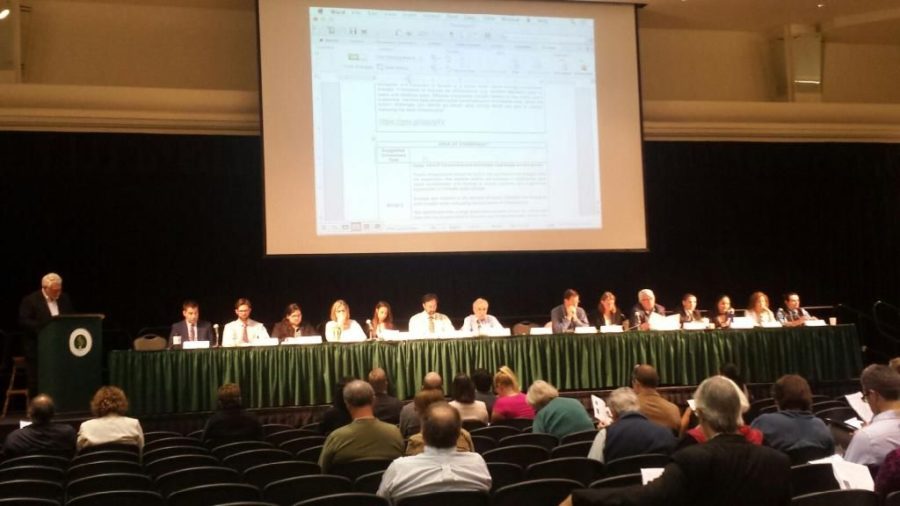Climate change conference comes to campus
Panelists speak on issues regarding water, fire and fish in California during the second day of the “Water and Fire” conference in the University Union, Monday, April 11.
April 11, 2016
Sacramento State hosted a conference this week to debate and find solutions to adapt to climate change in California.
“Water and Fire: Impacts of Climate Change” took place over two days on Sunday and Monday in the University Union. The event was orchestrated by the Institute on Science for Global Policy (ISGP).
Michelle Stevens, an environmental studies professor at Sac State, said the goal is to make Sacramento State a climate hub for the region.
“We aren’t debating whether or not climate change is occurring,” Stevens said. “We are dealing with the climate-induced challenges of mega fires, flooding, water quality and supply impairment, and loss of biodiversity.”
The conference was sponsored by the College of Social Sciences and Interdisciplinary Studies, SSIS Dean Orn Bodvarsson and the Provost’s Office and featured heavy involvement by a group of Sac State students.
The group of mostly environmental studies majors went through several nicknames, including The Climate Tigers, but ultimately decided to refer to themselves as Team Phoenix Rising.
The three guest scientists, experts in water, fire and fish, respectively, were: Roger Bales, director of the University of California Water Security and Sustainability Research Initiative; Jon Keeley, a senior scientist for the U.S. Geological Survey; and Christina Swanson, director of the Science Center at the Natural Resources Defense Council.
The conference highlighted the interconnectedness of water, forests, wildfires and biodiversity.
“One man’s efficiency is another man’s supply,” said Swanson of water conservation.
One audience member, Sally Schmidt, pondered the reality of that statement.
“Do you think that second man is being as careful with his water use as the first, though?” Schmidt asked. Schmidt, along with her husband Raymond Schmidt, have known ISGP founder and Executive Director George Atkinson since they got their undergraduate degrees together at Eckerd College in Florida.
The tragedy of the commons was a recurring theme throughout the conference. Cristina Munguia, a member of Team Phoenix Rising, gave a brief definition of the phenomenon.
“When there are multiple competitors all going for the same resource, there’s this idea that they all think the other person is going to do something,” Munguia said.
Matt Owens, a fellow Phoenix Rising, said that groundwater is a perfect example of this tragedy.
“We’ve always had basically unregulated, unmanaged groundwater in California,” Owens said. “If one person is taking more than their share, there’s no way of knowing.”
Andrew Hawkins shared some suggestions on how to overcome the tragedy of the commons.
“You incentivize decreased use by either attacking their wallets,” Hawkins said, “or you can promote it with tax breaks or subsidies for more efficient use.”
Some methods of attacking people’s wallets include imposing fines for overuse and raising water prices to more accurately represent its scarcity, Hawkins said.
Hawkins said the next step for the ISGP will be condensing the conference’s findings and suggestions into a booklet. There will be a launch party held at Sac State next semester to promote the book.
Along with students and community members, said Sweta Chakraborty, associate director if ISGP, California legislators will be invited to the booklet launch, allowing the ISGP to present the actionable next steps to the people who can effect change and write new policies.
After the morning’s debates, the conference participants’ consensus was condensed into nine pages of actionable next steps in the areas of water, fire and fish.
A few noteworthy suggestions were:
-
Implement and enforce the Human Right to Water Bill to ensure all Californians have safe drinking water.
-
Build future infrastructure in drought conditions and plan for droughts to get worse.
-
There should be a closer relationship between policies on fire management, water usage and land planning
-
Use incentives—positive and negative—to promote sustainable water use.
Frederika “Fraka” Harmsen, who Stevens said originally dreamed up this conference, summarized the issue of water scarcity with what she described as her favorite quote, from Lewis Lapham.
“Without water, there would be no wine, no roses, nothing over Dorothy’s rainbow except a pillar of salt.”
































































































































